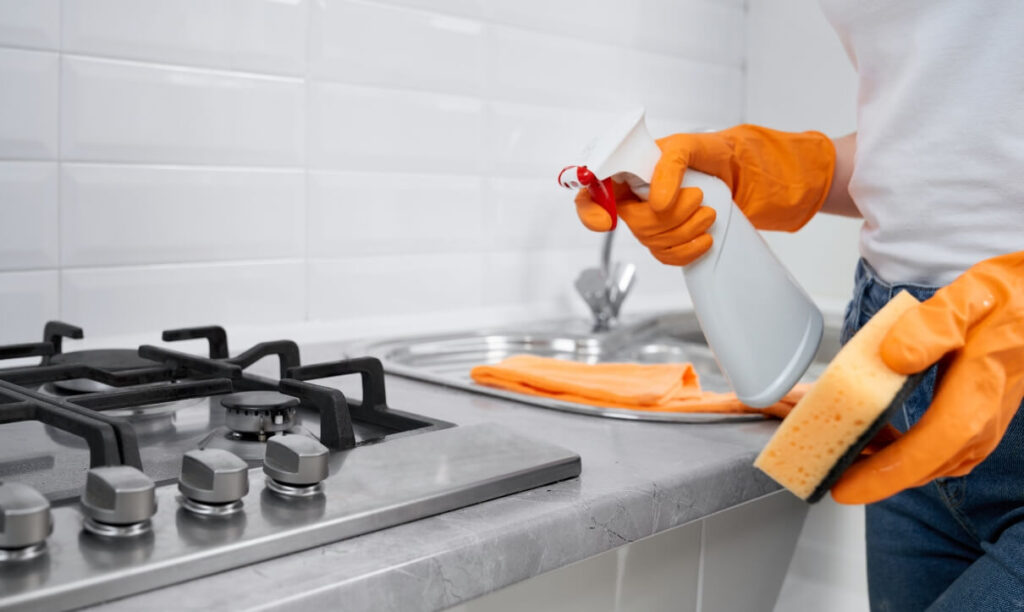
A spotless kitchen isn’t just a joy to work in—it’s essential for healthy and efficient cooking. Properly maintaining your tools and appliances not only extends their lifespan but also enhances their performance, leading to consistently delicious results.
In this detailed guide, we’ll explore effective techniques for keeping your kitchen tools and appliances in top-notch condition, drawing from practical experience and proven methods.
The Role of Maintenance in Streamlined Cooking
Focusing on kitchen maintenance transformed my cooking experience. Sharp knives made chopping effortless, a clean blender delivered silky results, and a well-maintained oven elevated the flavor of my roasted dishes.
It’s not about splurging on new gadgets—it’s about taking care of what you already own.
Essential Practices for Cutting Tool Care
Keeping Knives Sharp and Safe
A sharp knife isn’t a luxury; it’s an essential tool for safe and efficient cooking.
- Honing vs. Sharpening: These are not the same. Honing realigns the blade edge and should be done often, while sharpening removes material to restore the edge and is less frequent.
- Proper Storage: Using a knife block or magnetic strip prevents dulling and nicks, unlike storing knives loosely in a drawer.
Caring for Kitchen Shears
Often overlooked, kitchen shears are indispensable for a variety of tasks.
- Thorough Cleaning: Disassemble shears to clean hidden crevices, ensuring no food particles remain.
- Oil the Pivot: A drop of food-grade oil keeps them moving smoothly and squeak-free.

Prolonging the Life of Small Appliances
Efficient Blender Cleaning
Cleaning a blender can be tedious, but this hack works wonders: Fill the jar halfway with warm water and a drop of dish soap, then blend for 30 seconds. It’s fast, effective, and ensures your smoothies taste fresh.
Maintaining Your Coffee Maker
A well-maintained coffee maker ensures consistently great-tasting coffee.
- Hard Water Solutions: A vinegar-water cycle every few weeks prevents buildup and restores efficiency.
- Daily Cleaning Habit: Regularly washing the filter basket keeps your coffee maker running smoothly.
Caring for Large Kitchen Appliances
Keeping Your Oven Spotless
Consistent care keeps your oven efficient and clean.
- Weekly Wipe-Downs: Removing grease weekly with a damp cloth prevents buildup.
- Stubborn Stains: A baking soda and water paste left overnight works wonders on baked-on spills.
Refrigerator Maintenance
An organized, clean refrigerator not only reduces waste but also makes meal prep quicker.
- Transparent Storage: Switching to clear containers eliminates forgotten leftovers.
- Monthly Deep Cleaning: Set aside time to empty the fridge, wipe surfaces with soapy water, and vacuum the coils.
Cast Iron Cookware: Tips for Long-Term Use
Building a Seasoning Routine
After each use, rinse your cast iron, dry it completely, and apply a thin oil layer before heating briefly. This ensures a durable nonstick surface.
Removing Rust
Rust can seem like the end, but a mixture of salt, oil, and some scrubbing can bring your cast iron back to life.
Overcoming Common Kitchen Challenges
Tackling Grease on Pans
Heating white vinegar in the pan loosens tough grease, making it easier to scrub away.
Extending Appliance Lifespan
Follow manufacturer instructions for your mixers and food processors. Using the correct attachments and cleaning promptly helps avoid costly repairs.
Staying Motivated to Clean
Procrastination is tempting, but adopting a “clean as you go” rule makes maintenance manageable and rewarding.
Personal Reflection: My Blender’s Journey
Among all my kitchen appliances, my blender stands out as my most-used tool. From smoothies to sauces, it’s a workhorse.
Neglecting it once led to hardened food residue, which was a nightmare to clean. Now, I rinse it immediately and rely on the quick-clean hack to keep it spotless. Knowing it’s ready to perform gives me confidence in my cooking.